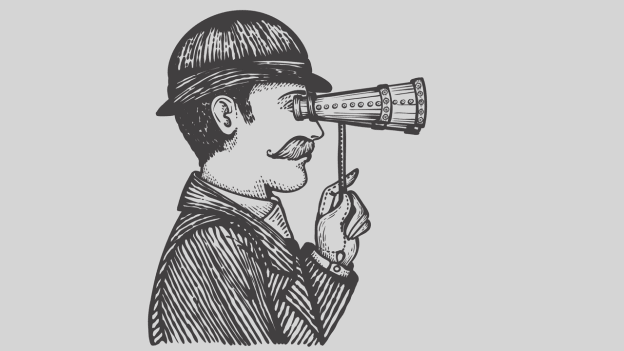Observational intuition: Making sense of what is staring at us

Have you ever had the feeling of being confounded by a clearly observable pattern that is seemingly inexplicable? While the reason is hiding in plain sight right in front of us, it suddenly all falls together with a simple explanation. As individuals, we are intuitively reactive and prepare better for well defined, near term events. Preparing proactively for slowly emerging trends like the consequences of connected markets and digital transformation requires observational intuition that most perceive subconsciously, but few act upon.
Observational Intuition can be defined as the process of actively engaging and applying intuition to all the observable, latent information that is otherwise consumed passively to continually create new opportunities.
These clearly observable events can have beneficial or catastrophic consequences for markets, companies and employees depending on their ability to visualize, contextualize, aggregate and make timely decisions on available, self-evident information. Without that ability, celebrated CEOs (think General Electric or Yahoo) who were considered geniuses have seen their strategies collapse, businesses fail and “lifer” employees become irrelevant.
The commonly accepted notion is that it takes genius to discover or invent breakthroughs, develop and articulate strategic models, or identify market dislocations. However, even geniuses really only extend and build upon an available body of work. Often, the original model fails (remember MySpace, AOL) but the refined versions succeed (think Facebook, Google). You often succeed by not being the first mover, but by using observational intuition to innovate and improve an existing idea, process, product or service. When markets, companies and technologies transform dynamically, what can employees do to act on observational intuition themselves, even if they are not geniuses?
The typical employee has no pretensions to brilliance or unique insights, but has pragmatic observations and intuitions on the state of affairs at the ground level. Those who don't keep up with change know that they will be rendered irrelevant. And yet, most are paralyzed by inertia to invest in, or reinvent themselves. Your personal interests are served best by your own observational intuition.
How can we proactively prepare for trends such as connected markets and digital transformation? Observational intuition may be the answer
Let us consider some successful titans from different fields in research, academia and business who connected the dots, identified niche needs and became iconic celebrities. Their life stories could have been as ordinary as the stories of other brilliant but unknown people who were not intuitive and did not constantly innovate and expand their boundaries. There are lessons of observation, intuition, preparedness, and agility for employees who are not as intellectually endowed, but nevertheless have to survive tumultuous changes by acting on their observational intuition.
Albert Einstein is perhaps the most iconic scientific celebrity, and his equation for the equivalence of matter and energy is the most quoted, but arguably least understood concept. This important theory which is foundational to our understanding of modern Physics was laid out by Einstein in a short paper of just three pages. At the time when Einstein’s theories were published, he was not an academic, researcher or part of a prestigious university. He was considered an “academic weakling” and worked as a clerk in the Swiss patent office. What Einstein did was to take the entire body of available information and harvest the data and observations. He applied his intuitive and brilliant insights to identify patterns and predict outcomes. The takeaway here is that he did not think only in logical or mathematical equations, but in relatable images, feelings or even musical structures to visualize the reality that he intuitively assumed to be true. He could see the individual trees and could step back to contemplate the entire forest. He used the body of existing information and had observational intuition on the data that already existed.
- As an employee at your workplace,
- Are you content in the status quo or do you exhibit a natural curiosity to take on persistent institutional problems?
- As the “expert” in your current role, do you have an insight on what needs change?
- Are you so lost in the trenches in getting everyday “stuff done” that you are looking at individual trees rather than the forest that encompasses the trees?
- Do you think beyond immediate deliverables to the longer roadmap, especially for yourself?
- Are you better off taking your game elsewhere or even being an entrepreneur before it is no longer your decision to make?
Clay Christensen was a Professor at Harvard Business School, advised global corporations and served on the Board of many of those. From his extensive experience of engaging with academic intellectuals and corporate titans, he coined the phrase “Disruptive Innovation”. The Economist called him “the most influential management thinker of his time”.
Disruptive Innovation does not have to be new or advanced technology, but often novel process changes applied cleverly to an emerging, niche value segment of the market by emerging companies. These start-ups from the fringe have the ability to disrupt the entire mainstream market controlled by traditional incumbents.
For mature companies and their employees who are coasting along, it is analogous to the temperature levels rising for a frog in a pot of “slow-boil” water. The frog does not even realize before it is too late that the water temperature has become too hot for it to survive. Disruption is happening in plain sight. For employees whose current positions are likely to be displaced by disruptive innovation,
- Is your observational intuition having you ponder over the fungibility of your skills or your alternatives?
- What is your “call to action” and the planned time horizon?
- Has your observational intuition enabled you to differentiate yourself in a pool of displaced talent?
Elon Musk has pushed the boundaries of science and space, helped launch several disruptive and innovative companies like Tesla, SpaceX, PayPal, SolarCity and The Boring Company.
Tesla products do not have a combustible engine, are sold and configured on their website in a Direct-to-Consumer model, so no dealers, repair services or intermediaries are needed. This will completely disrupt and dislocate the entire automotive industry as we know it, including its supply chains, dealers, vendors, and employees. The big bet is that all other automotive companies will be forced by markets and customers to abandon current strategies and product lines and convert to Tesla’s innovation of electric vehicles.
The future is staring at us, and if you are in the automotive industry eco-system, the time is now to prepare for the emerging industry of tomorrow.
- As an automotive engineer, would you rather gravitate towards electrical or software engineering to create and power the EV driverless cars of the future?
- Are you preparing to transition your car dealer sales skills or maintenance/ repair skills to another industry or upgrade your skills to support the next generation of vehicles?
For every acknowledged genius who is credited with profound original thinking and execution, there is a veritable graveyard of equally smart individuals whose ideas or work did not capture the public imagination.
A significant differentiator for the successful ones was their observational intuition, and making sense of what was right in front of them as an opportunity. The typical employee does not have to be a certified genius like the examples referenced. Neither do they need to make monumental discoveries or disruptive innovations. Geniuses and typical employees may share similar destinies based on their ability to actively engage and apply intuition to all the observable information around them, and create new opportunities for themselves. If hindsight is 20:20, perhaps Observational Intuition is a field glass to the future.
Read more such stories from the July issue on the theme 'The Digital Resert at Work.'
















